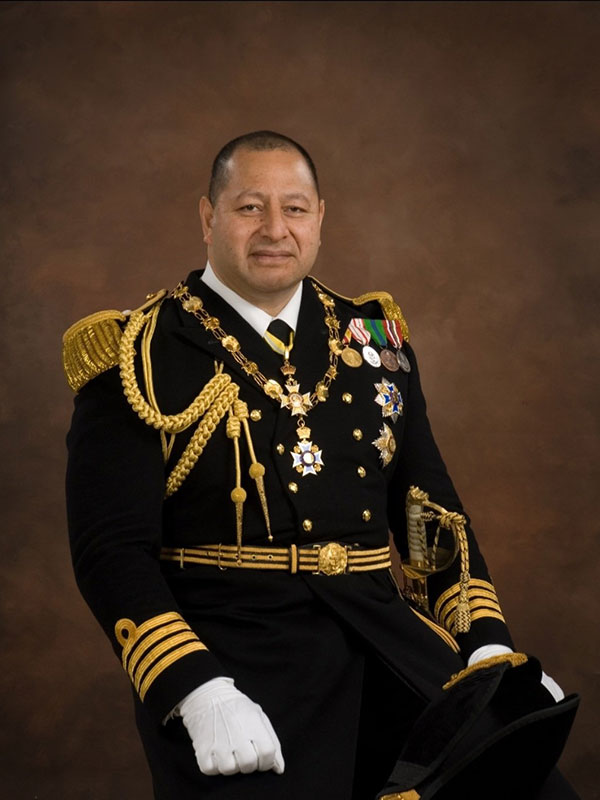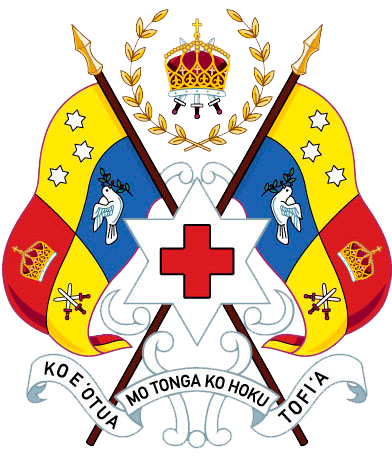Constitutional Monarchy
HIS MAJESTY KING TUPOU VI OF TONGA

Born ‘Aho‘eitu ʻUnuakiʻotonga Tukuʻaho, on 12 July 1959 in Nuku’alofa, he is the 3rd son and youngest of four children of Their late Majesties King Taufa’ahau Tupou IV and Queen Halaevalu Mata’aho.
‘Aho’eitu ‘Unuaki ‘o Tonga Tuku’aho received three chiefly titles as is customary in the Tongan tradition, He commonly used these titles Prince ‘Ulukalala Lavaka Ata, until he became Crown Prince.
 Prince ‘Ulukalala Lavaka Ata was educated at The Leys School, Cambridge then attended the University of East Anglia in 1980 where he graduated with a degree in Development Studies.
Prince ‘Ulukalala Lavaka Ata was educated at The Leys School, Cambridge then attended the University of East Anglia in 1980 where he graduated with a degree in Development Studies.
Upon returning to Tonga in 1982, the young prince joined the Navy at the Tonga Defence Services and gaining promotion to Lieutenant-Commander in 1987.
He graduated from the US Naval War College in 1988 and from 1990 to 1995 he took command of the Pacific-class patrol boat VOEA Pangai and led peace keeping missions in Bougainville.
In 1997, he graduated with a Masters in Defence Studies from the University of New South Wales and in 1999 he earned a MA in International Relations from Bond University, Australia.
Prince ‘Ulukalala Lavaka Ata joined the civil service in 1998 occupying two portfolios, Minister for Defence and Minister for Foreign Affairs. He was appointed Prime Minister from January 2000 to February 2006. Later that year he received the title Crown Prince Tupouto’a Lavaka when his elder brother became King George Tupou V.
In 2008, the Crown Prince was appointed Tonga’s first High Commissioner to Australia and Ambassador to Japan until his succession to the Throne in 2012, when his brother King George Tupou V passed away and immediately became King and Head of State.
His Majesty Tupou VI was formally crowned King in July 2015 in a series of ancient private and public ceremonies and religious services attended by both regional and global leaders who travelled to Tonga for this special occasion.
His Majesty married Nanasipauʻu Vaea on 11 December 1982 who his accession to the Throne became Her Majesty Queen Nanasipauʻu Tukuʻaho of Tonga.
Their Majesties have three children, HRH Princess Lātūfuipeka Tukuʻaho, born in 1983, HRH Crown Prince Tupoutoʻa ʻUlukalala, born 1985 and HRH Prince Ata, born 1988.
HRH Crown Prince Tupoutoʻa ʻUlukalala married Sinaitakala Fakafanua in July 2012. Their Royal Highnesses the Crown Prince and Crown Princess have four children born in 2013, 2014, 2018 and 2021. Their first born son HRH Prince Taufa’ahau Manumataongo is second in line to the Throne.
A THOUSAND YEAR OLD INSTITUTION IN TONGA
Tonga has been a monarchy for over 1000 years which has never succumbed to either colonial or foreign domination.
Since 1845, after the Constitution of Tonga formally established the role of Head of State and Sovereign, the first King of Tonga was King George Tupou I who reigned from 1845 to 1893. He was succeed by his great grandson King George Tupou II who reigned from 1893 to 1918. Following his passing, his daughter reigned as Queen Salote Tupou III from 1918 until 1965.
In 1965 Queen Salote was succeeded by her son, King Taufa’ahau Tupou IV who reigned until 2006. He was succeeded by his son King George Tupou V who reigned until 2012 when he was succeeded on his death by his brother and the current King of Tonga, His Majesty King Tupou VI.
Before the 1845 constitution the Tuʻi Haʻatakalaua ruled in Tonga as a dynasty of nineteen Tongan kings which originated in the 15th century and assumed political power from the Tuʻi Tonga line. In the 18th century, it merged power with the Tuʻi Kanokupolu dynasty.
Previously the Tuʻi Tonga – a line of thirty nine Tongan kings – ruled over a maritime Empire in Oceania which had its origins in 950 AD and reached its peak of regional power during between 1200–1500.
The dynasty originated in the tenth century around 950 AD with the mythical ʻAhoʻeitu and withdrew from political power in the fifteenth century by yielding to the Tuʻi Haʻatakalaua. The title ended with the death of the last Tuʻi Tonga, Sanualio Fatafehi Laufilitonga, in 1865, who bequeathed the ancient title and its mana to his nephew, Fatafehi Tu’i Pelehake, who was the Tu’i Faleua, or Lord of the Second House (traditionally supposed to succeed to the office of the Tuʻi Tonga should the original line of kings perish without a natural successor).
Tu’i Pelehake surrendered the title and its privileges to his father-in-law, King George Tupou I, who united its power and prestige with that of the Tu’i Kanokupolu, Tu’i Vava’u, and Tu’i Ha’apai titles to establish the modern-day institution of the Tongan monarchy.




